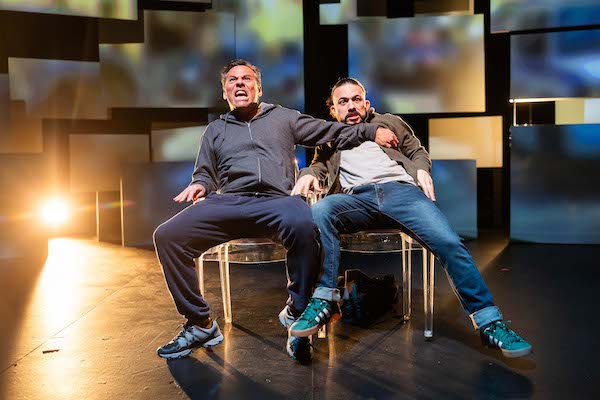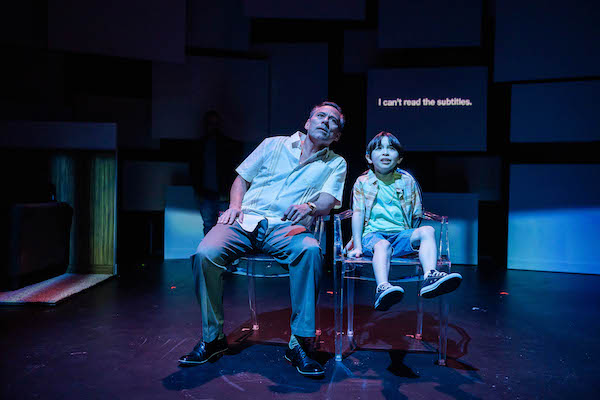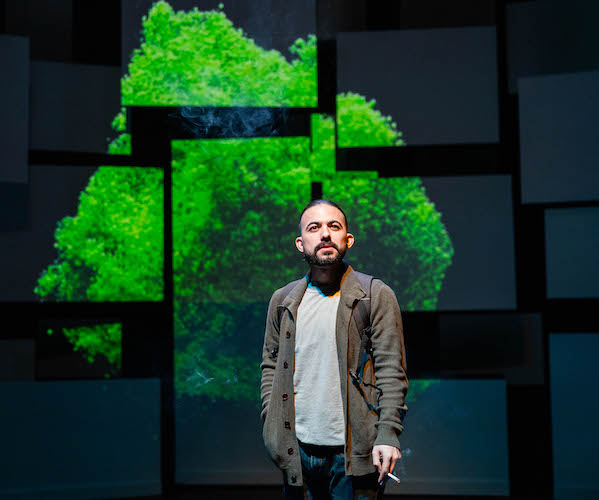Theater Review: “Machine Learning” — Artificial Intelligence as Caretaker?
By David Greenham
This is a rare script that focuses, equally, on emotional depth and scientific wonder.
Machine Learning by Francisco Mendoza. Directed by Gabriel Vega Weissman. Scenic design by Janie E. Howland. Costume design by Kiara Escalera. Lighting design by Amanda Fallon. Sound design by David Remedios. Projection design by SeifAllah Salotto-Cristobal. A Catalyst Collaborative@MIT production in partnership with Teatro Chelsea at the Central Square Theater, Cambridge, through February 25.

Jorge Alberto Rubio and Armando Rivera in the Catalyst Collaborative@MIT production of Machine Learning. Photo: Nile Scott Studios
There’s always a twist in Central Square Theater’s innovative Catalyst Collabotative@MIT program. Each year, a play comes along in which science and theater collide. The dramatic explosion might provide a new angle or insight into how art can be used to illuminate a neglected aspect of scientific history. Other CC@MIT productions have probed complicated scientific theories in a way that makes their value clear to an everyday theatergoer.
Rarely, however, does a script emerge that focuses, equally, on emotional depth and scientific wonder. And, on top of that, it also takes a crack at forecasting our future. Playwright Francisco Mendoza’s thought-provoking Machine Learning manages to strike that difficult balance.
Jorge (Teatro Chelsea Artistic Director Armando Rivera) is a Latinx student who has parlayed a lonely childhood dedicated to playing video games into a deep passion for artificial intelligence. His troubled father, Gabriel (Jorge Alberto Rubio), is a stubborn and bitter alcoholic who refuses to accept responsibility for his failures at work, his broken family, and his son’s deep hurt. The emotional ground around their relationship is littered with unspoken words and debilitating regret.
When Jorge talks his way into a full scholarship at the Center for Computer Science, he tells the administrator/professor Anita (Sugandha Gopal) about his dream to find a way to create an artificial intelligence app that can not only scan the internet for information in a moment’s notice, but will also be able to learn to think — based on the evidence that it collects.
“I think it would be an amazing discovery,” he tells her, “change the world!”
“For the better?” Anita asks.
The plot combines the father/son dynamic and AI development after Gabriel is diagnosed with advanced liver cancer. Jorge, who feels he must take care of his ill father in some way — or at very least help him take care of himself — decides to incorporate his AI research into treating his father.
Jorge’s AI project is Arnold (voiced on opening night by director Gabriel Vega Weissman). The name was inspired by the actor Arnold Schwarzenegger, who played the cyborg character in The Terminator, a film Gabriel forced Jorge to watch when he was way too young.

Jorge Alberto Rubio and Xavier Rosario in the Catalyst Collaborative@MIT production of Machine Learning. Photo: Nile Scott Studios
Arnold is an AI ‘nurse’ specifically designed to keep Gabriel “comfortable and alive” by creating his medical care plan, organizing his roster of medicines, and monitoring the patient’s progress.
Jorge restricts Arnold’s behavior with science fiction writer Isaac Asimov’s three laws of robotics in mind: A robot may not injure a human being or, through inaction, allow a human being to come to harm; a robot must obey the orders given it by human beings except where such orders would conflict with the First Law; and a robot must protect its own existence as long as such protection does not conflict with the First or Second Law.
The story takes place in Brooklyn during 2015 and 2016, though flashback scenes are interspersed, set in the early 2000s, that feature Gabriel and Young Jorge (child actor Xavier Rosario). These reveal key stages in the crumbling relationship between father and son.
Shifting between English and Spanish, Machine Learning moves easily from location to location thanks to Janie E. Howland’s simple set of screens and movable walls: they are pulled out to reveal a living room set, hospital bed, office desk and chairs, and whatever else is needed. Kiara Escalera’s costumes are modern and practical; Amanda Fallon’s agile lighting is helpful in crafting changing locations.
Particularly effective and clever: projection designer SeifAllah Salotto-Cristobal’s use of iconic photos to suggest various locations and the amorphic pulsating collection of brilliant green blobs that portray Arnold. The moving mass is projected directly upstage, and it somehow manages to put the spotlight on Arnold’s voice, eliminating what would otherwise be little more than a robotic drone of text. It’s highly amusing to watch Jorge interact with Arnold, especially as the guy tries to figure out exactly what to say to get Arnold to follow through on desired priorities. Combined with David Remdios’ atmospheric sound, Arnold becomes more than a futuristic gimmick — it is an important character in the story.

Armando Rivera in the Catalyst Collaborative@MIT production of Machine Learning. Photo: Nile Scott Studios
Sugandha Gopal’s Anita is compassionate yet cautious. The figure provides a much-needed critique of the strategies Jorge uses to help Arnold learn.
Precocious young actor Xavier Rosario, though sometimes a little too quiet, gives a comfortable and fun performance as young Jorge. The character’s scenes, all with his father Gabriel, are emotionally challenging. Rosario is more than up to the task.
But at the heart of Machine Learning is the conflict between Jorge Alberto Rubio’s Gabriel and Armando Rivera’s grown-up Jorge. Appropriately, it is emotional learning that powers this play. Rubio is stalwart as he races from scene to scene, each time showing the accelerating effects of his illness or revealing the conditions that contributed to it, such as his drinking. Rivera, as his son Jorge, conveys the character’s suffering and frustration, though his angst is leavened by his pride at having created a computer breakthrough like Arnold. Like most of the machines and robotics that populate science fiction, Arnold works wonderfully — right up to the moment it doesn’t.
We are watching to see if the growth of AI will move beyond being a profitable novelty and become a beneficial tool. We don’t know the answer to Anita’s question yet. Will AI make the world better? Or immeasurably worse?
To be continued….
David Greenham is an adjunct lecturer on Drama at the University of Maine at Augusta, and is the former executive director of the Maine Arts Commission. He has been a theater artist and arts administrator in Maine for more than 30 years.
Tagged: Armando Rivera, Central Square Theater, Francisco Mendoza, Gabriel Vega Weissman, Jorge Alberto Rubio, Machine Learning
